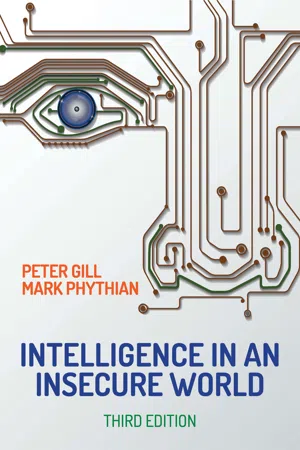
- English
- ePUB (mobile friendly)
- Available on iOS & Android
Intelligence in An Insecure World
About this book
Security intelligence continues to be of central importance to the contemporary world: individuals, organizations and states all seek timely and actionable intelligence in order to increase their sense of security. But what exactly is intelligence? Who seeks to develop it and to what ends? How can we ensure that intelligence is not abused? In this third edition of their classic text, Peter Gill and Mark Phythian set out a comprehensive framework for the study of intelligence, discussing how states organize the collection and analysis of information in order to produce intelligence, how it is acted upon, why it may fail and how the process should be governed in order to uphold democratic rights. Fully revised and updated throughout, the book covers recent developments, including the impact of the Snowden leaks on the role of intelligence agencies in Internet and social media surveillance and in defensive and offensive cyber operations, and the legal and political arrangements for democratic control. The role of intelligence as part of 'hybrid' warfare in the case of Russia and Ukraine is also explored, and the problems facing intelligence in the realm of counterterrorism is considered in the context of the recent wave of attacks in Western Europe. Intelligence in an Insecure World is an authoritative and accessible guide to a rapidly expanding area of inquiry – one that everyone has an interest in understanding.
Tools to learn more effectively

Saving Books

Keyword Search

Annotating Text

Listen to it instead
Information
CHAPTER ONE
What Is Intelligence?
Towards a Definition of Intelligence
countering terrorist violence is the top priority for CSIS. Terrorism, which has become a global phenomenon, is a very real threat to our national security. Terrorists and their supporters come from a variety of countries, cultures, political systems and socio-economic backgrounds. They include both highly educated elites and more humble ‘foot soldiers’. Followers are recruited from around the world, including our own country. CSIS strives to prevent terrorist acts from being planned in Canada, from occurring on Canadian territory and from affecting Canadian citizens and assets abroad.5
These limitations are best offset by ensuring that the ultimate users of intelligence, the decision-makers at all levels, properly understand its strengths and limitations and have the opportunity to acquire experience in handling it. It is not easy to do this while preserving the security of sensitive sources and methods. But unless intelligence is properly handled at this final stage, all preceding effort and expenditure is wasted.8
In so far as it seeks to forecast the future, assessment based on intelligence will seldom be precise or definitive. This is particularly so when it seeks to understand complex developments and trends in future years. Greater precision is sometimes possible in relation to intelligence’s warning function – highlighting the possibility of a specific event in the near term future … But even in this field, precision will be hard to achieve. Intelligence will rarely provide comprehensive coverage of a topic. More often it is fragmentary and incomplete.9
Table of contents
- Cover
- Copyright
- Preface to the Third Edition
- Abbreviations
- 1 What Is Intelligence?
- 2 How Do We Understand Intelligence?
- 3 Who Does Intelligence?
- 4 How Do They Gather Information?
- 5 How Is Information Turned into Intelligence?
- 6 What Do They Do with Intelligence?
- 7 Why Does Intelligence Fail?
- 8 How Democratic Can Intelligence Be?
- 9 Intelligence for a More Secure World?
- Selected Further Reading
- Index
- End User License Agreement
Frequently asked questions
- Essential is ideal for learners and professionals who enjoy exploring a wide range of subjects. Access the Essential Library with 800,000+ trusted titles and best-sellers across business, personal growth, and the humanities. Includes unlimited reading time and Standard Read Aloud voice.
- Complete: Perfect for advanced learners and researchers needing full, unrestricted access. Unlock 1.4M+ books across hundreds of subjects, including academic and specialized titles. The Complete Plan also includes advanced features like Premium Read Aloud and Research Assistant.
Please note we cannot support devices running on iOS 13 and Android 7 or earlier. Learn more about using the app